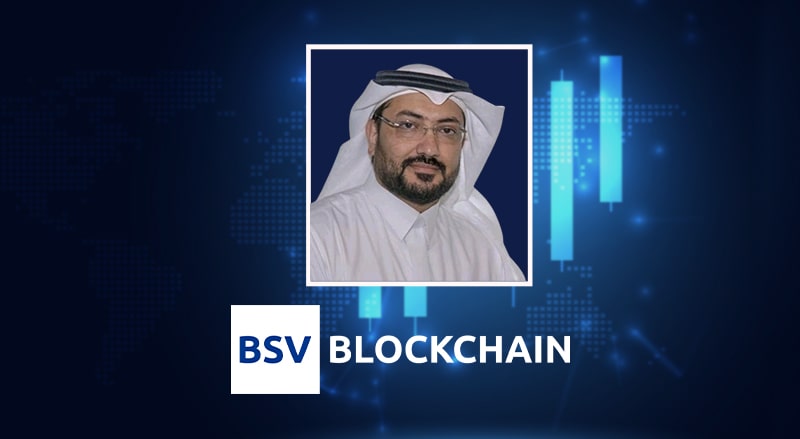The Kingdom of Saudi Arabia is deeply invested in digital transformation. Through programmes such as its ‘Saudi Vision 2030’ initiative, it aims to accelerate technological adoption and innovation across all sectors of the economy. As a result, Saudi Arabia is one of the leading countries in the world in blockchain adoption and research.
Dr Basim Zafar, the CEO of Experts Vision Consulting and an experienced executive and academic within the technology industry, has unique insight into the digital transformation of Saudi Arabia and specifically its interest in blockchain technology.
Dr Basim was a key speaker at several recent events held in partnership with the BSV blockchain’s association in Saudi Arabia, where he shared his knowledge of the country’s digital transformation initiatives and the potential ways the BSV blockchain could be used to realise its goals.
The BSV blockchain is the only public blockchain in the world which scales unbounded thanks to its unlimited block size while retaining the secure proof-of-work consensus mechanism that is the foundation for its immutability and transaction validation. For this reason, it is an ideal blockchain protocol on which large-scale solutions for enterprise and government entities can be built efficiently.
Following the Blockchain for Saudi Vision 2030 Summit in Riyadh, Saudi Arabia, we sat down with Dr Basim to speak about the utility of the BSV blockchain and how it can be applied to challenges in Saudi Arabia.
BSV for real-world and metaverse applications
Dr Basim’s company, Experts Vision Consulting, is focussed on working with the Saudi Arabian government to deploy innovative technology projects to accelerate its digital transformation and boost technical capabilities in both the private and public sector. It was in the course of this work that he first encountered BSV, which he says immediately impressed him.
‘Three years ago was the first time I met a member of the BSV blockchain’s association, and we were discussing applying smart contracts to some of the projects we were working on in Saudi Arabia. After that, we started working together on a pilot project with a governmental organisation in Saudi Arabia,’ he says.
‘Since then, it has been very good. We have built a good relationship with the team and I have become very interested in blockchain technology.’
He adds that the unique capabilities and scalability of the BSV blockchain make it a powerful candidate for large-scale applications driving innovation across the world.
‘I think BSV is different than other technology. It brings high-speed blockchain movement and large block sizes which is currently needed. And with the introduction of IPv6 integrated with blockchain, I think this world will be changed – a lot of applications will open up in the real world and in the metaverse world.’
‘Currently, we are working on more than 30 projects with the government. For a lot of these projects, I think they are capable of introducing blockchain into their technology – for example, for waste management, or Smart Hajj or project management. I think all these projects can have blockchain infrastructure connected to their current systems, and this is the beauty of the BSV blockchain – you don’t need to change the technology you are currently using; you can integrate it with the BSV blockchain,’ Dr Basim says.
Blockchain solutions in Saudi Arabia
Dr Basim explains that Saudi Arabia has an innovation-friendly approach to cutting-edge technologies like blockchain, which will serve it well in cementing its position as a global leader in digital initiatives.
‘Saudi Arabia is set to become a global leader of the digital economy through adopting and implementing emerging technologies such as blockchain AI, and 5G within the private and public sectors. Saudi Arabia was amongst the first countries that applied blockchain through some of the pilot programmes they did through different government organisations,’ he says.
‘The Zatak, Tax and Customs Authority of Saudi Arabia had a project in 2019 where they applied blockchain technology to the monitoring and importing goods from outside Saudi Arabia. The Ministry of Finance through the central bank also adopted a pilot project where they transfer money using a blockchain network. The Communications and Information Technology Commission also has its own different blockchain project.’
The potential applications of blockchain technology in Saudi Arabia range far beyond payments and supply monitoring, however. From Smart Hajj to vaccination status monitoring, there are endless possibilities for blockchain integration in Saudi Arabia.
‘I think blockchain can be applied in many ways here in the public sector. I think this is especially true for Hajj, there are a lot of applications in Hajj that can use the benefit of blockchain. For example, we have people coming from around the world, more than 200 countries, coming to Mecca every year to perform Hajj,’ Dr Basim says.
‘We can use blockchain to record the identity of those people, to create health records for them, and currently with this COVID 19 pandemic, we can also track their vaccine status for when they come to Makkah, to be sure they have been vaccinated. There also many other blockchain applications that can work across the boundary of the of the kingdom to cover the globe.’
